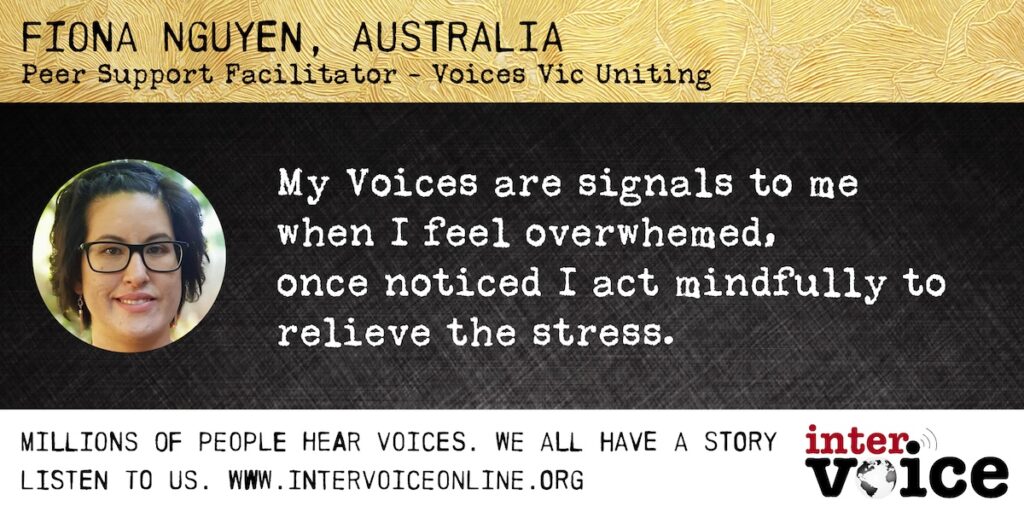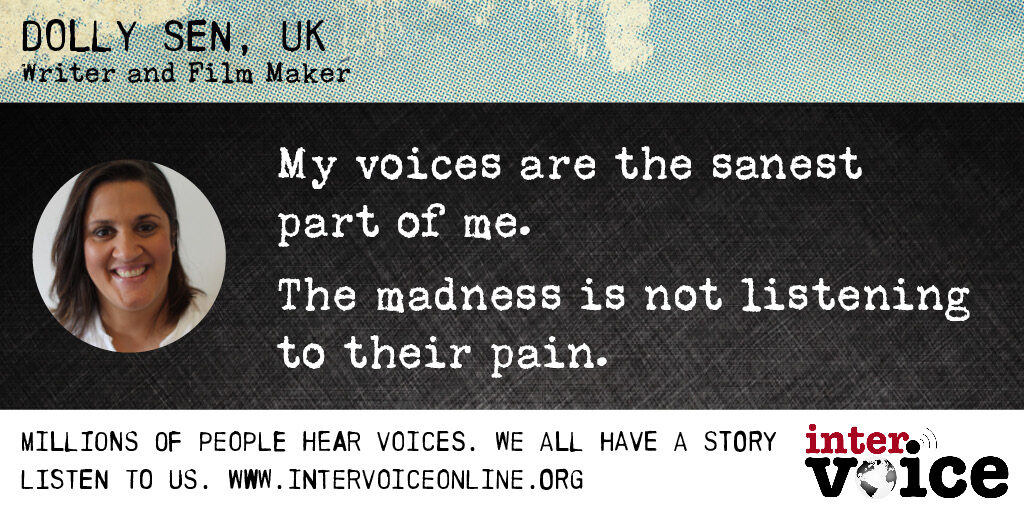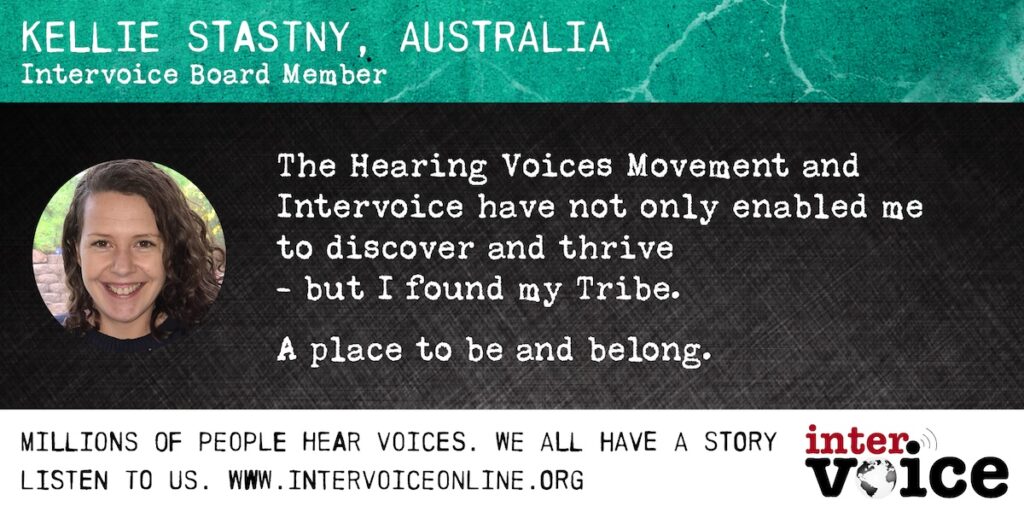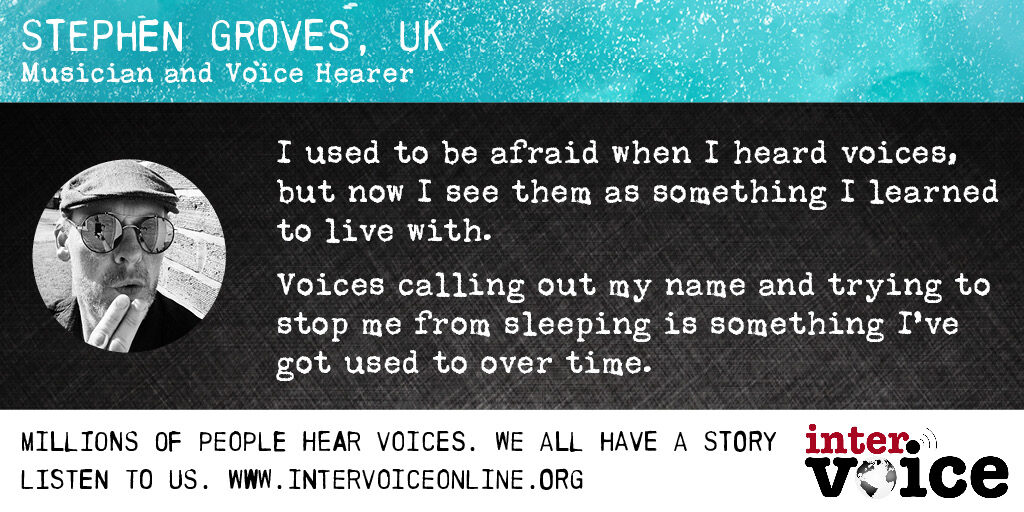In this piece Mark Ellerby shares some of what he has learnt about navigating voice-hearing and self-esteem from his own experiences.
It is common for people with schizophrenia to hear voices criticizing them, including their delusions. Often, these voices also criticize other aspects of their lives. Voice dialogue can play a significant role in improving self-esteem and assisting individuals in their personal growth, akin to climbing the Maslow Tree. It is essential to address this issue seriously, as the voices can exacerbate distress and lead to thoughts of suicide.
The voice dialogue approach can complement existing strategies such as cognitive behavioural therapy and compassion-focused therapy. However, these therapies may not prove as effective when there is a lack of insight or the presence of “never loser psychology.” In such cases, alternative approaches may be necessary to address the voices effectively.
The impact of voices on our self-esteem varies depending on their content and focus. In my case, the voices were triggered by the delusion of causing 9/11, but their criticism extended beyond this belief. Understanding the specific nature of the criticism is vital, as some aspects may affect our self-perception more significantly than others.
The voices can be persuasive in convincing you of being a bad person. However, it is essential to engage in dialogue and formulate reasons to challenge their assertions. Each type of criticism may require a unique response, and this account will outline how to deal with them effectively.
Challenging and standing up to the voices can lead to a restoration of self-esteem. Nevertheless, this may prove more difficult when the criticisms hold some truth. In my case, the connection between the voices and the delusions of causing 9/11 made it challenging to dismiss them entirely, given the substantial basis for their claims. On the other hand, some of their criticisms were less certain.
We all harbor our internal critic, and the voices can amplify and reinforce this self-critical aspect. However, it is possible to ignore this internal critic most of the time, which can help reduce the influence of the voices. Similarly, being overly critical of ourselves only empowers the voices, so it is essential to change such thought patterns.
Examining our feelings about the voices is crucial. Being compassionate towards ourselves, in contrast to the voices’ lack of compassion, presents an opportunity to challenge the voices’ assertions. This way, we can counter their impact. Nevertheless, the voices can be highly persuasive and may diminish our sense of compassion.
Drawing on your self-knowledge can empower you to counter the voice’s criticism. Your family can also play a vital role in supporting you during this process. However, it may require some introspection, particularly when your identity has been impacted by the challenges of schizophrenia. In such cases, the knowledge and understanding of your family become crucial.
Insight into your delusions, particularly those involving causing 9/11, can significantly impact your self-esteem and provide a basis for responding to the voices’ criticism. It is essential to question and doubt the delusion’s validity to lessen the voice’s influence. When uncertainty is present, standing up to the voices becomes more manageable.
Utilizing other approaches alongside self-awareness can be beneficial. However, having insight into your condition may raise questions and doubts. Nevertheless, this knowledge can be utilized to emphasize your positive qualities, especially when the voices start to subside. This way, you can focus more on building your self-esteem.
Engaging in voice dialogue can further reduce the voice’s impact, making it easier to resist its influence with your own thoughts. Combining voice dialogue with insight, as in my case where doubts about causing 9/11 arose, can further weaken the voice’s hold. This allows for a more manageable resistance.
The stigma surrounding schizophrenia may hinder family support. In cases where emotional connections have been lost, the number of individuals willing to challenge the voices alongside you may be limited, emphasizing the importance of a supportive psychologist as a lifeline.
Attempting to address the voices’ claims about causing 9/11, I explored historical wars and revolutions for answers. Moreover, I perceived other negative thoughts, such as being responsible for poverty and cancer, as contributing to society’s betterment, making us better people. However, the voices still rejected this perspective, insisting that I had caused harm.
Initially, believing I deserved the criticism for causing significant harm, I later contemplated the many atrocities throughout history. While this approach didn’t eliminate the voices, it did help me restore a sense of self-esteem, realizing that I was no worse than many well-known historical figures.
Still the voice can be very intelligent in criticizing you morally. It said the other atrocities in history were also not acceptable. Yet taking history into account you can match this, and you can get into an philosophical argument about things. This didn’t cure the voice but at least I could stand up to it.
The key is to have positive reinforcement especially from your friends and family. Their care and love will soothe the criticism of the voice and calm you down enough to meditate on your good points. Knowing your good qualities will then lessen the impact of what you are getting from the voice.
When we esteem ourselves, we can be true to who we are. Our friends will hold us in high regard for being ourselves. It is normal to feel bad about oneself occasionally, but such feelings typically subside over time. Speaking with friends and discussing what others have said about you during such instances can reaffirm your self-esteem.
Remembering your positive qualities and focusing on them can serve as a distraction from the voice’s influence. This shift in focus should bring a soothing effect, diverting your attention away from the voice. Moreover, this focused mindset can enable you to formulate responses to the voices more effectively.
The support and admiration from your friends can bolster your self-esteem, despite the voices’ criticism. You can utilize this positive regard to engage in a dialogue with the voices. Remind the voice that your friends will support you, and you have loyal and lifelong friends who believe in you.
The voices may know you well, but your family and long-standing friends also have a deep understanding of your character. Drawing on this direct knowledge of how they perceive you as a good person can empower you to introspectively respond to the voices. Meditating on these emotional connections will reinforce your sense of self and provide a response to the voice.
My CPN (Community Psychiatric Nurse) suggested that 9/11 could be viewed from a certain perspective as a political act with both criticisms and defences. Additionally, the cognitive therapist suggested that the harm I might have caused in other ways could lead to personal growth and improvement. However, these arguments failed to satisfy the voices, especially regarding 9/11.
The voices criticizing me held immense power and persuasion, making it challenging to confront them. Nevertheless, it’s crucial to recognize that the force of the ultimate truth about oneself is more potent than the voices heard. Acknowledging that you are not inherently a bad person and reinforcing this truth can help weaken the voice’s hold.
The voices of friends and family, while they may not completely silence the voices you hear, can potentially lessen their intensity and frequency. To achieve this, it might help to recognize the voice as just another voice, distinct from those that support and care for you from friends and family. This way, you can confront the voice more assertively.
When the voices become overwhelming, it may be difficult to engage in a rational dialogue with them due to fear and distress. In such situations, it is crucial to find ways to calm yourself before attempting to respond to the voices. Breathing exercises and distracting yourself with a positive mental image of a safe place can be helpful strategies. With time, as the voices become less pronounced, this challenge may reduce.
Confronting the voices might require assistance before being able to assert your own voice effectively. Supported graded exposure could prove beneficial, as the voice’s severity may vary, and it may not consistently instil the same level of fear. Alternatively, you may need to learn to coexist with the fear. In some cases, medication like Valium could also help in managing distress. Moreover, the support of your family, who takes your side, can be calming and empowering.
Focusing excessively on the voice may prevent you from being mindful of your positive qualities. It might be necessary to practice mindfulness to overcome this challenge. For instance, setting a daily alarm on your phone to remind you to focus on your own voice can be an effective way to shift your attention. With time and dedication, this practice can become more natural and beneficial.
As humans, we all have faults, but family, friends, and partners are often forgiving and understanding of them. Engaging in dialogue with the voices about our imperfections might lead to a similar sense of forgiveness. However, confronting the voice’s unforgiving nature may require this compassionate approach. Despite the voices’ disdain for our faults, we can remind ourselves that we are loved and valued by others despite these shortcomings.
The voices may seem more focused on our faults than how others generally perceive us. You can remind the voice that most people do not interact with each other in such critical ways. Although the voice might stubbornly adhere to its stance, you can use this reasoning to challenge its criticism effectively.
The voices can tend to be excessively harsh in their criticism, magnifying our faults out of proportion. It is essential to recognize that our faults may not be as severe as the voices portray them. Reminding the voice of this reality can potentially reduce its punishing nature.
Experiencing occasional self-doubt and a tarnished self-image is a normal aspect of life. Despite these moments, we often find ways to lift ourselves up and feel better again. Understanding this can help you engage in discussions with your friends, who can reassure you that these negative feelings will pass. As a result, the voices may subside when these emotions fade away.
In life, it’s normal not to be overly concerned about what others think of you. You can often brush off such concerns as a part of life. However, the voices can be more challenging to ignore. You may assert that you are not bothered by its opinions, but when the voice criticizes you for being responsible for 9/11, it might still find reasons to persist.
Remind yourself of all the positive contributions you have made in life and keep a diary of compliments and kind words people have said about you. This diary can serve as a powerful reminder of your good qualities, offering additional positive reinforcement. When faced with the voice’s criticisms, you can compare it to the affirmations in your diary, countering its negative claims.
Maintaining frequent contact with friends and family is especially valuable as their loving conversations about you can distract you from the voice’s focus. Their support can shift your attention to positive and uplifting matters. It’s important to recognize that despite the voices’ disapproval, you still receive love and care from your family and friends.
The voices may refuse to engage in a dialogue, dismissing your right to be listened to. However, you can handle this situation by acknowledging that you still have valid points to make. Under certain conditions, the dialogue with the voice might resume, offering an opportunity to address its criticisms.
Opportunities to rectify your faults can potentially reduce the voice’s criticisms. Engaging in useful activities like voluntary work or performing acts of kindness, such as buying Christmas presents for friends and relatives, can serve as counterpoints to the voice’s negative claims. In your case, pursuing writing about mental health provided a platform to dialogue with the voice and validate your perspective.
Yet in my case the voices still think all this doesn’t make any difference as being a writer doesn’t make up for killing people. Despite your efforts, the voices may still dismiss your positive achievements, claiming that being a writer cannot make up for any perceived wrongs. Nevertheless, if your motivations are genuine and aimed at helping others, this standpoint can serve as a valid response to the voices. Embracing this perspective may alleviate some of the self-blame and guilt.
Making mistakes in life and committing actions that we shouldn’t are common experiences that the voices can criticize. However, it’s crucial to recognize that such errors are part of the human experience and can happen to anyone. Challenging the voices’ criticisms by acknowledging the universality of human imperfections can offer a more compassionate perspective.
The voices can instil self-doubt, and they may exploit the natural tendency for us to doubt ourselves. They can prey on this vulnerability, making it necessary for additional reassurance from our friends. However, it’s essential to recognize that such experiences are widespread, and we all encounter moments of self-doubt.
Moreover, negative thoughts about ourselves can trigger the observing voice. This is a natural experience, and often, we manage to overlook these thoughts without falling into negativity. Choosing not to react negatively to such thoughts can help keep the voice quiet.
The voice is also provoked by the regrets we carry from past actions, leading to immediate criticism. In these moments, it is important to remind ourselves that everyone makes mistakes, and nobody is perfect.
The voices may criticize me for supporting capitalism and accuse me of being oppressive. However, I recall Peter Gabriel’s lyrics, “you did nothing wrong.” It’s essential to recognize and esteem the positive contributions I’ve made in life, even if they are subject to criticism, especially when there is political opposition involved.
To initiate a dialogue with oneself and to confront personal faults, it’s crucial to see oneself objectively. As humans nobody is perfect, and the support of friends can reinforce this understanding. Additionally, recognizing and working to correct personal faults can lead to fewer criticisms from the voices.
You have got to be able to see yourself for the dialogue to begin and to have the courage to see your faults. Again, nobody is perfect, and your friends will reinforce this again by liking you for who you are. Then you can also further correct some of your faults so the voices will have less to criticise about.
You have got to be able to hear your own voice and you might need a therapist to dialogue with the voices you hear before you can do this. Then you can self-forgive your faults using you own voice to reinforce this. You can show the voices this is very possible. So that they might do the same.
You will learn to dislike what the voices is saying. Yet disliking the voice might antagonise it. So instead, you need to show it that it is being unfair. The voice may think it is being perfectly fair so this might take some persuading. In my case this was only possible so far. Instead, you need to illustrate to the voice that its criticisms are unjust. Convincing the voice of its unfairness might require persistence and patience. In your case, you have achieved this to some extent.
In life, we often oppose things we disagree with or find unjust. These experiences can be useful to draw upon when standing up to the voices. Recognizing that the accusations made about us may not be fair is a powerful thought, suggesting that we deserve justice in response to these criticisms.
Overcoming the fear generated by the voices is essential to effectively challenge them. In my case, the voices criticize me for being responsible for 9/11, and building self-esteem requires confronting this fear. Supported graded exposure, as in my case, can be a method to achieve this, among other possible approaches.
At times, the voices may present very generalized criticisms, such as labelling you as a “bad person,” without specific examples. In such instances, you can challenge these general claims without delving into further detail. Often you will have to consult yourself about the criticisms and see what you think. It might take time to think it through, but you may come up with an answer to them. What you are hearing may not be the whole story about you. Then you might come up with ways of stopping its influence.
To challenge the voice effectively, you must be willing to stand up for yourself. Just as you don’t tolerate abuse from others, you shouldn’t accept it from the voice. Embrace the notion that, in life, you sometimes must engage in conflicts with others, and this principle applies to standing up to the voice.
Visualizing the voice and attributing it to a particular persona can enhance your ability to challenge it. Utilizing the authority of your family’s support can strengthen your arguments against the voice. Additionally, you can point out that even those who criticize you have their own faults, thus highlighting the voice’s imperfections. With your family by your side and your own voice, multiple sources will defend you, reinforcing your confidence.
When the voices attack your faults, you can demonstrate that you possess kindness and caring qualities. Friends and family can support this perspective by recounting the acts of kindness you’ve shown. Maintaining a diary of such positive actions can further enhance your self-esteem.
The voices may mirror the hate some people harbor toward you. In response, you can assert that it is their prerogative to feel that way, and it doesn’t dictate your worth. Remind yourself of your caring and loving nature as a counter to the voice’s hateful remarks. Recognize that hate is a common phenomenon, and many individuals must learn to overcome it.
Occasionally, the desire to be a good person might lead to excessive remorse. Being aware of this vulnerability is crucial. The voices might exploit this and intensify their criticisms. However, remember that there are answers to address these thoughts. It’s essential not to be too hard on yourself in such situations.
You need ways of cheering up after the voices have stopped as what they say will stick in your mind. Then you can restore your self-esteem more. Spending time with friends and family can soothe any remaining criticism from the voice. Having a wish list also works here. So, you feel less depressed.
You need to tell yourself you deserve the best in life and to be happy. The voices will contradict this, so you must keep reminding yourself. You can use this as a maxim in life and tell yourself the voices are being very unfair. You can tell them that though they might not accept it.
The voice may find your weaknesses and try to exploit them as a punishment. This in my case for causing 9/11. You need to tell the voice you don’t deserve to be punished to stop this. Again, having family on your side will carry as much authority as the voice does. So they can help to persuade it there is no reason to punish which will also make you feel safer from them.
Sometimes the need to be a good person can cause too much remorse. You need to be aware of this. The voices might try to take advantage of this and try to criticise you further. Yet again this too will have an answer. So we don’t beat ourselves up too much about it.
The voices can reinforce self-hatred, particularly in individuals struggling with feelings of being a “loser.” As a result, these individuals find it challenging to see themselves positively and develop self-esteem. The voices may also criticize one for feeling like a “loser.” Answering this requires learning to genuinely like oneself, which can be a difficult process.
The saying, “Just be yourself,” often holds truth, allowing you to stand up to the voice. However, individuals grappling with feelings of being a “loser” might find it hard to embrace this advice alone. Addressing the voice’s criticisms might involve working on one’s psychological perspective and self-acceptance. It’s essential to recognize that changing this psychology will be a gradual and challenging journey.
Learning to genuinely like yourself is vital for developing self-esteem. Creating a list of your good points and faults allows you to make an overall assessment of yourself. From there, you can work on developing new positive attributes and continually add to the list. Furthermore, actively addressing, and correcting aspects you dislike is essential for personal growth.
It’s essential not to be submissive to the voice’s criticisms, just as one shouldn’t allow others to criticize without response. Learning to stand up for yourself and finding the courage to do so is necessary. However, if learned submissiveness from childhood is present, this process may be more challenging. The voice may criticize you for perceived weakness, but this can be answered by recognizing your efforts to build courage.
When facing criticism, it’s essential not to let the voice’s comments go unchallenged. Just as you would respond to others who criticize you, you should answer the voice back and defend yourself. Speaking with assertiveness and confidence can match the power of the voice. Finding courage may require gradual development, and having someone supportive by your side when confronting the voice can be beneficial. Ultimately, learning to stand up for yourself and respond to the voice in a confident manner is crucial for personal growth and overcoming its influence.
In the end the voices will be silenced, less frequent or quieter. That should allow long periods in between where you can learn to like yourself more. If the voices are there nearly all the time this will be much more difficult and may require a psychologist to get you started with it.
Conclusion
In conclusion, developing self-esteem through voice dialogue and understanding ourselves is essential for personal growth, overcoming the suffering caused by the voices and help us to self actualise. With the support of clinicians and our loved ones, we can successfully challenge the voices and enhance our self-worth despite the challenges of a diagnosis of schizophrenia.
If we can esteem ourselves this will help us self-actualise and not to have our identity spoiled by the illness. We are going to be a lot happier with ourselves and our lives. This will end the suffering which is inflicted by the voice and help us grow as people. This should be the goal for service users and clinician in dealing with schizophrenia and voice hearing.
– Mark Ellerby, 2023












